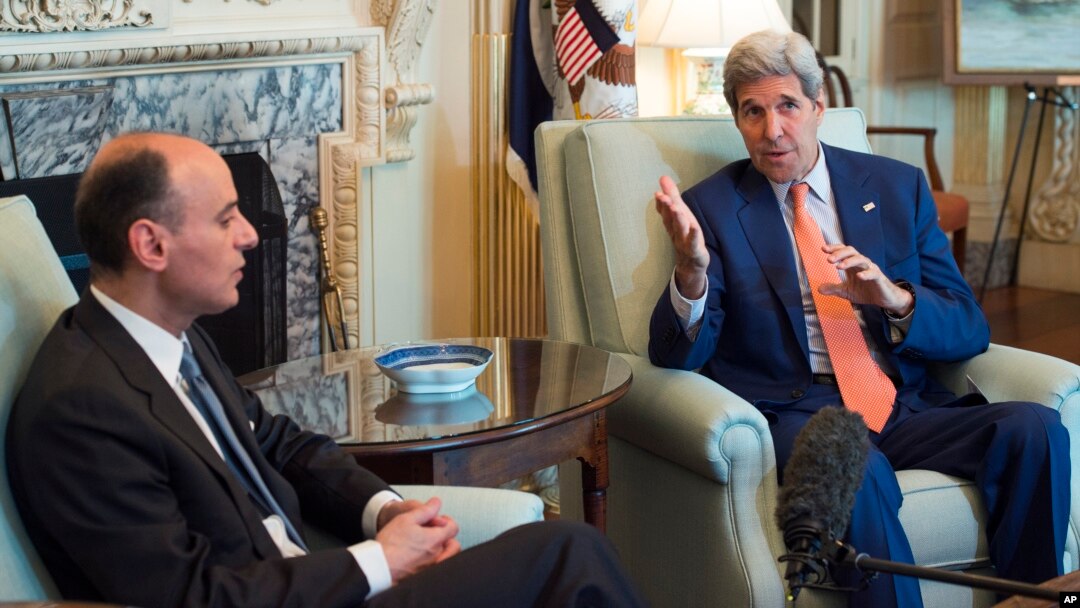The United Nations Security Council is expected to adopt a resolution ratifying the deal reached between Iran and six world powers next week in Vienna.
The vote, scheduled for Monday , will begin the process of gradually lifting international sanctions imposed on Iran, with Tehran giving up its nuclear program in exchange.
It comes even as the negotiators of the pact continue their efforts to sell the agreement to critics across the world.
Top American and British diplomats appeared to make little headway Thursday in easing Saudi and Israeli fears about the historic international agreement aimed at keeping Iran from building a nuclear weapon.
In Washington, U.S. Secretary of State John Kerry met with his counterpart, Saudi Foreign Minister Adel al-Jubeir, whose government has been alarmed about the deal with regional rival Iran.
Watch: Iranians celebrate sanctions deal:
Your browser doesn’t support HTML5
Iranians React to Nuclear Sanctions Deal
Afterwards, Jubeir warned Iran not to use the money it is likely to gain as economic sanctions are lifted against it to fund "adventures in the region."
"If Iran should try to cause mischief in the region we're committed to confront it resolutely," Jubeir said.
Israeli Concerns
In Jerusalem, British Foreign Secretary Philip Hammond sparred publicly with Prime Minister Benjamin Netanyahu about the deal before heading into private talks.
Netanyahu said the Jewish state would have preferred that Tehran change its behavior first before economic sanctions levied against it by the United Nations and the West were eased.
He called it "perplexing" that the pact does not address Tehran's call to annihilate Israel.
Hammond said he understood Netanyahu's concerns about the deal, acknowledging that Iran's "regional conduct" will "have to be dealt with in the months and years to come" and that the West is "not naive about this."
Ahead of his trip to Israel, Hammond told the British parliament Wednesday that the Jewish state wants a "permanent standoff" with Tehran, but Netanyahu said Hammond was "wrong" in his assessment.
Visiting British Foreign Secretary Philip Hammond, left, and Israeli Prime Minister Benjamin Netanyahu hold a joint press conference in the prime minister's office in Jerusalem, July 16, 2015.
The British diplomat, who helped negotiate the pact announced this week, said the six world powers that reached accord with Iran "would not have agreed to the deal unless we were sure we had robust measures in place to deliver effective oversight of Iran's nuclear program."
Netanyahu has called the deal a "historic mistake" and is seeking to defeat its legislative approval in Washington.
"He has made clear that he intends to fight it all the way and that Israel will seek to use its influence in the U.S. Congress to obstruct the progress of the deal," Hammond said. "I'm confident that that action will not succeed."
Obama Defends Deal
U.S. President Barack Obama made a vigorous defense of the deal Wednesday at a White House news conference that was carried on live television through much of the world, although not in Iran.
Obama contended that the deal is the best way to keep Iran from having a nuclear weapon, rejecting attacks on it from Republican opponents in Congress and Republican presidential candidates seeking to succeed him when his White House tenure ends in early 2017.
"If 99 percent of the world community and the majority of nuclear experts look at this thing and they say this will prevent Iran from getting a nuclear bomb, and you are arguing either that it does not or that even if it does, it's temporary... then you should have some alternative," he said.
Vice President Joe Biden and House Minority Leader Nancy Pelosi of Calif., leave a meeting with the House Democratic Caucus about the Iran nuclear deal, July 15, 2015, on Capitol Hill in Washington.
Vice President Joe Biden, who on Wednesday met privately with Democrats from the House of Representatives, returned Thursday to Capitol Hill to hold similar talks with Democrats on the Senate's Foreign Relations Committee.
Obama has said he will veto any congressional rejection of the plan during the 60-day review period that lawmakers will have. If that occurs, the House and Senate would both need a two-thirds majority to override the veto.
Cindy Saine contributed to this report from Capitol Hill.
WATCH: Key Republican Senator Corker angry over Iran nuclear deal
Your browser doesn’t support HTML5
Key Republican Senator Corker Angry Over Iran Nuclear Deal
WATCH: VOA interviews Sen. John McCain on Iran nuclear deal
Your browser doesn’t support HTML5
Top Republican Concedes Congress Unlikely to Block Iran Nuke Deal


